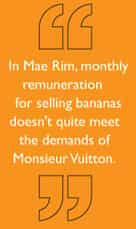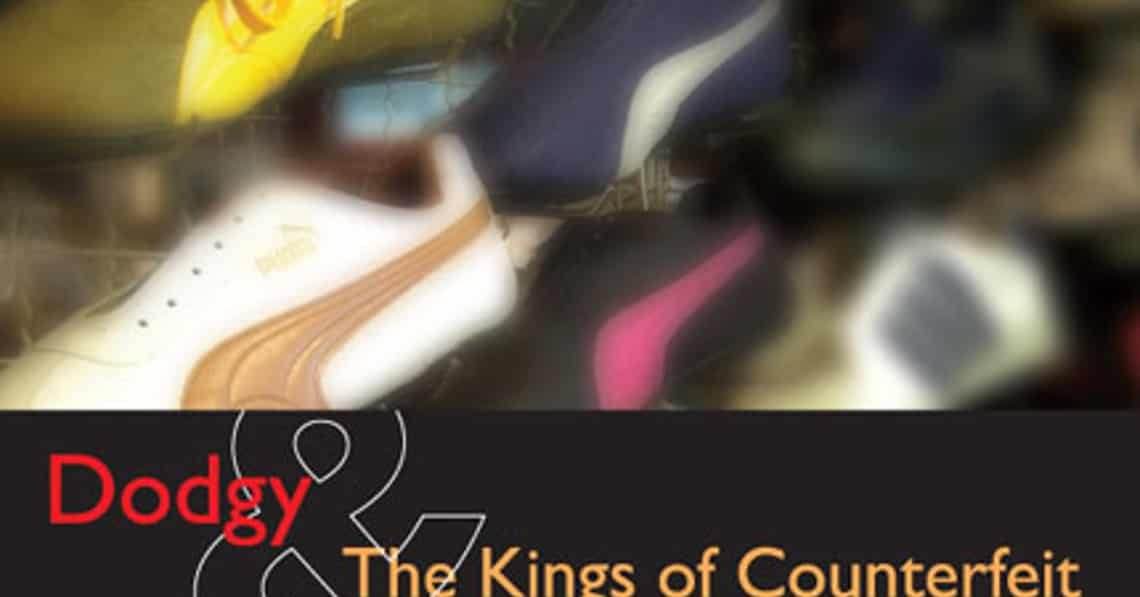It’s raining, naturally, and a drenched man with a stunning tan walks into a dank pub in some monochrome mill town in Northern England, his purple and black shell suit reflects in the eyes of the stoic drinkers. He drops a suitcase on the floor while spectators crowd round, as he opens the tattered box he says, “Lacoste ara tenner a pop; proper good Rolexes: twennie-five, and these Tags: twennie; ‘ave some beauty trainers in’t car too if yer like.” And that’s how the proles up north discovered Thailand, that tropical paradise where all the fake stuff comes from. Before China’s illustrious reign in the world of dodgy apparel, the Thais were no doubt the kings of counterfeit. Though even though dethroned by its assiduous neighbour, Thailand, according to the copyright cops, is still as crooked as they come, and piece by piece, lyric by lyric, they intend to take it all off the streets.
In May police busted various red areas (where police are proactive and take
Piracy is big business, millions of baht worth of pirated and counterfeited products leaves Thailand each year and a huge amount of gear is sold within the country. Pretty girls, from Mae Rim to Massachusetts, envision themselves carrying a brown bag with an LV monogram authenticating their status, but unfortunately, in Mae Rim, monthly remuneration for selling bananas doesn’t quite meet the demands of Monsieur Vuitton. Though in the spirit of true Thainess, in the vein of Mohammad’s famous parable, if Thais can’t afford couture culture, they simply create it here for a fraction of the price. Job well done, pragmatic thinking? Not according to Thailand’s Ministry of Commerce or Department of Intellectual Property (DIP) who are consistently under heavy pressure from multi-national companies who own registered trademarks. These companies can file a report to the Ministry or even go straight to the police if they know someone is impinging on their copyright, and this does sometimes happen, but not often; you have to wonder what the Thai marketplace would look like if the law was stringently enforced. Rather than arrest and close down thousands of shops and jail even more thousands of traders, the DIP has “in recent years sponsored well-publicised public education initiatives designed to educate its population that trade in counterfeit goods has damaged Thailand’s ability to migrate from a primarily agrarian economy to an industrialised economy that can compete in the globalised marketplace,” said Edward J. Kelly and Vipa Chuenjaipanich in a 2002 report on intellectual property in Thailand.
The Night Bazaar in Chiang Mai, MBK and Panthip Plaza in Bangkok, are still very much functioning under seemingly very little scrutiny. Though not for long we hear. The Ministry of Commerce is now in the process of waging – nuclear – war against counterfeit. In an interview with Citylife a source from the DIP explained the ins and outs of the current dodgy market economy. “Chiang Mai has four red areas,” he explained, “Night Bazaar, ICON, Rincome Market and Computer Plaza. There are twenty five red areas in total throughout the country.” He also mentioned yellow areas, of which Chiang Mai has none, where the private sector has an obligation to cooperate with the police, where the cops don’t work proactively and so will not raid the premises. Music, films and software, he went on, are Thailand’s biggest counterfeit vices, while leatherwear, bags, and surprisingly, automobile parts are also hot items. The goods in question mostly come from China. He took umbrage at the assumption by the international community that hardly anything is done to counter the counterfeiters, maintaining that many traders are closed down. “There is an Economic Crime Police of the Central Investigations Division (IPR) working nationwide,” he explained. It is not illegal to buy counterfeit products, although in early June, Deputy Minister of Commerce Alongkorn Ponlaboot, organised a focus group with the DIP, police, registered trademark owners and mall owners to work towards drafting a new law to make the purchasing of counterfeit goods illegal. The law has not yet been proposed to the legislative branch of government though it could be soon. “We don’t want people to lose their jobs, their income, we want to educate people so that they will sell legal products, OTOP products.” And so it may be conceivable that soon the classily dressed but poor in purse will be penalised, made to pay a hefty fine.
Saliently, Edward J. Kelly and Vipa Chuenjaipanich stated in their report that the real criminals were a, “diversified portfolio of immense and well-organised criminal organisations also responsible for trade in drugs, weapons, and human smuggling.” There has also been much controversy surrounding the ‘shakedowns’ by the piracy police and their legitimacy; bars in Chiang Mai and many other parts of Thailand have been raided for playing Thai songs without licenses, though some of the music companies who ostensibly work with police on the raids have denied any part in it. In 2007 Banyong Limprayoonwong, Deputy Director General of the Department of Intellectual Property, did admit that “extortionists” and “corrupt officers” were demanding fines from unwitting nightspot owners. If the new law is passed you have to wonder how it’s going to be enforced and if it will be enforced without the typical, inimical, deceit and venality.
In Chiang Mai’s Night Bazaar, traders talked of counterfeit goods and the nascent prohibitions that may affect their livelihoods. “It’s not a problem, they can’t stop us selling,” said one trader, and soon more traders came to stand nearby, “It’s not possible,” they all agreed. She explained that selling copies normally generates about five times the profit of selling locally made products, consequentially this lucrative business is hard to close down. Another trader admitted, “They can’t arrest us, we know when the (piracy) police from Bangkok are coming so we take down the stalls.” How do they know? The municipal potentates, the same gang which allows – at a cost – traders to stay open, tip off the owners when the counterfeit officials are coming. In a quasi socialist way, the counterfeit coffers are distributed to many grasping hands. “It won’t stop,” he said, “as long as they are getting money from us.”
Another controversial point worth looking at when considering counterfeit is the fact that without a few counterfeit products – for instance computer software – (poor) people are at a disadvantage when it comes to personal developments and therefore are not competitive when it comes to learning and skills. When posed this question a Microsoft Media relations agency employee told Citylife that this was a “sensitive topic”. Certain counterfeit products in Thailand may be essential for those who cannot afford the bona fide package. Though the onus is on the government to make sure that such necessary products are available at local market cost, or even provided for free to the needy.
Is it really conceivable that Thailand’s kings of counterfeit will ever change their spots? Countering counterfeit is tricky business, you have to consider all those sticky fingers, consumer necessity, and of course laws that are loosely enforced by the – often – unlawful law men. Does the legislative bureau actually have any idea what is going on at ground level? Whatever your stance is, one thing is for certain, Thailand will remain dodgy for some time to come.
